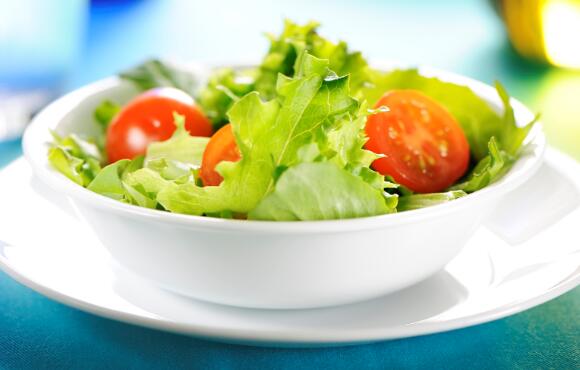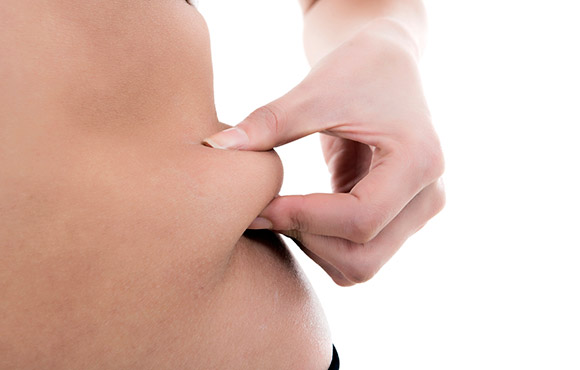But if your weight loss has plateaued or you've hit a snag, it's time to reassess. Check out these 10 unexpected reasons you're not losing weight.
1. You're Skimping on Protein
1 of 11
Whether you prefer lean meats, tofu or legumes, make sure you're eating enough protein--especially when you're lowering your overall calorie intake. To ensure lower numbers on the scale are reflecting a drop in fat and not muscle, it's important to have adequate protein in your diet.
Studies have found that people with diets where protein comprised 15 to 25 percent of their daily calories stored 45 percent of excess calories as muscle, while those who ate only 5 percent of their calories from protein stored 95 percent of excess calories as fat.
Starting the day off right—say with eggs instead of sugary cereal—can help curb cravings throughout the day, too.
2. You're Not Drinking Enough Water
2 of 11
While the 8x8 rule (drinking eight, 8-ounce glasses of water a day) is somewhat dated, it's still important to stay hydrated. The human body is 50 to 65 percent water, and all vital life processes—from your heart pumping to nutrients reaching your cells—need water to function.
Aside from helping your body maintain a happy homeostasis, filling up on water can also help with weight loss and portion control. There are even signs it may help with the rate at which calories are burned. A small study in the Journal of Clinical Endocrinology and Metabolism found that drinking more water may increase metabolism, with 500 milliliters of water increasing subjects metabolic rate by 30 percent.
3. You're Overwhelmed
3 of 11
An appointment here, an obligation there, and before you know it, all your free time is booked. If you're feeling overwhelmed, stress could be sabotaging your weight loss.
Cortisol, the stress hormone your body releases on days when you feel like you're drowning, directly effects fat storage and weight gain. In fact, being stressed out could be a long-term problem for your physique. A study from researchers at the University College London found that people with higher cortisol levels tended to have a larger weight circumference and a higher BMI.
4. You're Charging It
4 of 11
These days, it's less common to carry cash than plastic, but the surge in "charge it" mentality could be tied to rising obesity rates. A study in the Journal of Consumer Research found that people who used credit cards when grocery shopping bought more unhealthy, calorie-dense foods than those who paid with cash. Not having to shell out green on the spot could encourage impulse buys that affect your waistline.
5. You're Skimping on Sleep
5 of 11
You might be happy with just a few hours each night, but your body isn't. As it turns out, sleep isn't optional. Poor sleep has been shown to be one of the biggest risk factors for obesity. Not only does sleep deprivation alter the hormones that control hunger, but one research study in New Zealand followed 1,037 children from birth to age 32 and found that each one-hour reduction in childhood sleep was associated with a 50 percent higher risk of obesity.
6. You Aren't Eating Whole Foods
6 of 11
You might think that grabbing 100-calorie packs and "healthy" prepackaged products is aiding your weight loss journey, but it could be hindering it. Eating whole, single-ingredient foods—those that don't need a nutrition label on the package—can help improve health and regulate appetite. Vitamins, minerals and fiber also help you stay fuller longer.
7. You're Eating Too Much Healthy Food
7 of 11
Weight loss is all about calories in versus calories out. If you're eating too much food—even healthy food—you're liable to pack on unwanted calories. Portion control is key. While recommended calorie intake differs from person to person (and varies based on weight, height and activity level), you can use the following as a meal guide: lean protein should be the size of your fist, complex carbs the size of your palm and veggies two times that.
Also be aware of the nutrition behind even the whole foods you're consuming. While filled with vitamins and minerals, fruit, for example, is also rich in calories, carbs and the simple sugar fructose. Feel free to nosh on nature's candy, but do so in moderation.
8. You're Drinking Your Calories
8 of 11
It's easy to sip and forget, but if you notice yourself gravitating towards fruit juices or fancy coffee drinks in lieu of water, it might be time to track your liquid intake. Even artificially sweetened diet drinks have been shown to still trigger sweet receptors in the brain, leading you to crave food. If you're a bit of a weekend warrior, alcohol—which contains an average of 7 calories per gram—could be the bane of your weight loss.
9. You Aren't Eating Enough Calories
9 of 11
If you're looking to lose weight, it's likely you've cut back on calories, but dropping your intake too low can hinder weight loss. Not eating enough can send your body into starvation mode and slow your metabolism. Calorie deficits much higher than 400 calories a day can reduce the activity of your thyroid hormone, shut down sex hormone production and raise stress levels.
10. You're Only Doing Low-Intensity Cardio
10 of 11
If you typically talk on the phone while taking leisurely walks on the treadmill, don't be surprised if the weight's not coming off. While they have their place, lower-intensity workouts shouldn't be all you're doing.
During high intensity interval training (HIIT)—which include all-out bursts of 100 percent effort followed by short rest periods—you increase speed, power, endurance and metabolic rate, which helps you burn fat faster. HIIT even boosts calorie-burn long after you've stepped off the treadmill by increasing your resting metabolic rate for up to 24 hours.
Get ACTIVE on the Go


Couch to 5K®
The best way to get new runners off the couch and across the finish line of their first 5K.
Available for iOS | Android





Discuss This Article